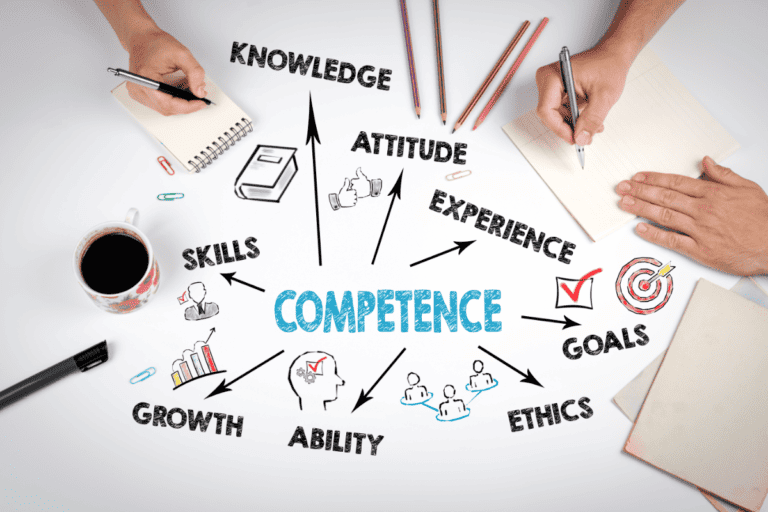Strategies for Effective Team Building
|
Getting your Trinity Audio player ready...
|
You can’t afford to overlook the importance of effective team building. It’s the key to maximizing your team’s potential and achieving outstanding results.
By implementing proven strategies, you can create a cohesive and high-performing team. Building trust, encouraging open communication, promoting collaboration, fostering a positive team culture, and organizing team-building activities are essential components of successful team building.
These strategies not only enhance teamwork but also boost morale and productivity. With the right approach, you can transform your team into a well-oiled machine that thrives on collaboration and achieves remarkable success.
Key Takeaways
- Foster open communication and transparent dialogue to build trust and rapport within the team.
- Encourage active listening and constructive dialogue to promote open communication and address conflicts directly and professionally.
- Promote collaboration and inclusivity by establishing a safe environment for open dialogue and equal participation in discussions and decision-making processes.
- Prioritize team bonding activities, provide positive reinforcement, and create a supportive and harmonious work environment to foster a positive team culture.
Building Trust and Rapport
To build trust and rapport within your team, start by fostering open communication and demonstrating reliability in your actions. By establishing connections through transparent and honest dialogue, you create an environment where team members feel comfortable expressing their thoughts and ideas. Encouraging open communication allows for the exchange of feedback and the sharing of diverse perspectives, fostering a sense of inclusivity and understanding within the team.
Additionally, creating camaraderie through team-building activities and informal gatherings can help strengthen the bonds between team members. These activities provide opportunities for team members to interact in a relaxed setting, fostering a sense of unity and solidarity.
Furthermore, demonstrating reliability in your actions by following through on commitments and consistently delivering high-quality work instills confidence and trust within the team. When team members can rely on each other to fulfill their responsibilities, it builds a foundation of trust and rapport that’s essential for effective teamwork.
Encouraging Open Communication
To encourage open communication within your team, promote active listening and constructive dialogue as essential components for building a culture of transparency and collaboration.
Active listening involves fully concentrating, understanding, responding, and remembering what’s being said. Encourage team members to listen without interrupting, show empathy, and ask clarifying questions to ensure a thorough understanding of the message being communicated.
Additionally, create an environment where constructive dialogue is valued. This means fostering a culture where team members feel comfortable expressing their thoughts, ideas, and concerns openly and respectfully. Implementing regular team meetings and open forums can provide opportunities for team members to engage in meaningful discussions and share their perspectives.
Furthermore, conflict resolution should be approached with the goal of finding mutually beneficial solutions. Encourage team members to address conflicts directly and professionally, focusing on the issue at hand rather than personal differences.
Promoting Collaboration and Inclusivity
Encourage diverse perspectives and active participation to foster collaboration and inclusivity within your team. Embracing diversity initiatives is crucial in creating an environment where every team member feels valued and included. Here’s how you can promote collaboration and inclusivity:
-
Establish a Safe Environment: Encourage open dialogue and create a safe space for team members to express their thoughts and ideas without fear of judgment.
-
Implement Conflict Resolution Strategies: Equip your team with effective conflict resolution skills to address any issues that may arise and ensure that all voices are heard and respected.
-
Promote Equal Participation: Actively seek input from all team members and ensure that everyone has an opportunity to contribute to discussions and decision-making processes.
-
Celebrate Differences: Emphasize the value of diversity and promote an inclusive culture where individuals are recognized and celebrated for their unique perspectives and contributions.
Fostering a Positive Team Culture
Fostering a positive team culture requires fostering trust and empathy among team members, creating a supportive and harmonious work environment.
To achieve this, prioritize team bonding activities that allow members to connect on a personal level. Encouraging open communication and active listening can enhance understanding and empathy within the team.
Positive reinforcement is also crucial for cultivating a supportive culture. Recognize and celebrate individual and collective achievements to boost morale and motivation. When team members feel valued and appreciated, it contributes to a more positive and cohesive work environment.
Additionally, promoting a sense of belonging and camaraderie through team-building exercises can further strengthen the team’s bond. By organizing activities such as group problem-solving challenges or team outings, you can foster a shared sense of purpose and unity.
Ultimately, creating a positive team culture requires intentional efforts to build trust, promote empathy, and provide positive reinforcement, resulting in a more cohesive and supportive work environment.
Implementing Team-Building Activities
First, plan specific team-building activities that align with your team’s goals and dynamics. Consider the following when implementing team-building activities:
-
Problem solving: Engage your team in activities that require problem-solving skills, such as escape room challenges or scavenger hunts. These activities can encourage collaboration and critical thinking while fostering a sense of accomplishment when the team successfully solves a problem together.
-
Outdoor adventures: Organize outdoor activities like ropes courses, hiking, or camping trips to promote teamwork and trust. Outdoor adventures provide opportunities for team members to bond in a different environment and overcome challenges together, strengthening their relationships and communication skills.
-
Team sports: Incorporate team sports such as soccer, volleyball, or basketball to encourage friendly competition and teamwork. Sports activities can help build camaraderie, improve morale, and enhance the team’s ability to work together towards a common goal.
-
Creative workshops: Host creative workshops such as painting classes, cooking challenges, or music sessions to inspire innovation and collaboration. These activities can ignite creativity, boost morale, and foster a supportive and inclusive team culture.
Conclusion
As you continue on your team-building journey, imagine a web of trust, open communication, collaboration, and positivity weaving its way through your team.
Picture the bonds growing stronger and the connections deepening.
Keep fostering that inclusive and supportive culture, and don’t forget to sprinkle in some fun team-building activities to keep the momentum going.
You’re on the path to building a powerhouse team that’s unstoppable.
Keep it up!







